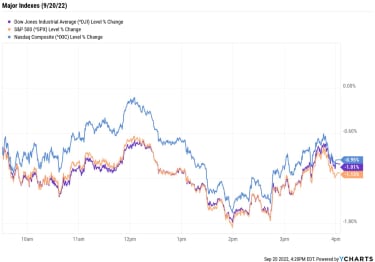Anxiety got the better of Wall Street on Tuesday, with the stock market reducing ahead of tomorrow’s policy periodical from the Federal Reserve.
Many of Wall Street’s top minds are weighing in on how huge the Fed rate hike will be. Among them is Brad McMillan, chief investment officer for Commonwealth Fiscal Network, who, like nearly all, believes the central bank will hike rates by 75 basis points. A basis point is one-one hundredth of a percentage point.
“Where things get appealing is in the follow-up observations, where the market tries to parse what this means for the Fed’s policy decisions through the rest of the year,” McMillan says, referring to the press talks Fed Chair Jerome Powell will hold at once after the periodical. “Expectations are very hawkish, and the Fed can come out just as probable and still be more dovish than probable. That likely limits the market downside from this meeting and just may provide some upside going forward.”
But today, investors envisioned higher rates ahead, which weighed on bond prices – and sent the 10-year Reserves yield up 7.2 basis points to 3.561%, its highest perch since 2011.
Broad selling was seen in the equities market too, with all 11 sectors dying in the red. As for the major indexes, the Dow Jones Manufacturing Average plunged 1.0% to 30,706, the S&P 500 Index gave back 1.1% to 3,855, and the Nasdaq Composite shed 1.0% to 11,425.

Other news in the stock market today:
- The small-cap Russell 2000 surrendered 1.4% to 1,787.
- U.S. crude futures fell 1.5% to end at $84.45 per barrel.
- Gold futures shed 0.4% to settle at $1,671.10 an ounce.
- Bitcoin gave back 2.9% to $19,006.96. (Bitcoin trades 24 hours a day; prices reported here are as of 4 p.m.)
- PayPal Holding (PYPL) tumbled 3.6% after Susquehanna Fiscal Group analyst James Friedman downgraded the fintech stock to Neutral from Clear, the equivalents of Hold and Buy, correspondingly. “Braintree is quickly gaining share within PYPL’s total payment volume, making halfhearted control from mix,” Friedman writes in a note. PYPL bought the e-buying web payments PC in 2013. “As Braintree is likely to take up again driving PYPL as a whole, its unit economics may drag on PYPL’s consolidated results. Consensus may underestimate the yield and transaction expense difficulty which PYPL may encounter. And margin control from headcount management and the the makings externalization of PYPL’s consumer credit book may not be enough to offset,” the analyst adds.
- Deutsche Bank analyst Sidney Ho downgraded Western Digital (WDC) to Hold from Buy, sending shares down 3.0%. “We believe WDC’s fiscal first-quarter revenue and EPS are tracking below the low end of guidance, and fiscal second-quarter outlook are also likely to be expressively below current Street estimates,” Ho says. The analyst points to fading demand and falling average selling prices for flash that will likely take up again through the next two quarters. “Consequently, we urge investors go to the sidelines until we have better visibility into when supply demand balance returns,” Ho adds.
What Corporate Warnings Could Mean for Investors
One notable decliner today was Ford Motor (F), which tumbled 12.3% after it became the latest company to warn that broad-market headwinds will weigh on its third-quarter results. The automaker late Monday said it expects Q3 return before appeal and taxes to arrive between $1.4 billion and $1.7 billion, about half of analysts’ consensus assess. This is due to “nonstop supply-chain issues, with 40,000 to 45,000 ‘vehicles on wheels’ left over in supply as they are waiting on parts,” says Michael Reinking, senior market strategist at the New York Stock Chat. “While those sales are pushed out to the fourth quarter, the company also augmented its inflation-related supplier costs.” (Ford now expects costs to run about $1 billion more than what was earlier probable.)
The strategist notes that while Ford’s periodical doesn’t “paint a similar surroundings” to last week’s FedEx (FDX) return warning, it does call into inquiry how huge of an impact macroeconomic trends like inflation and slowing growth will have on the imminent return season. Here, we take a closer look at what these caution signs from corporate America could mean for investors.
Karee Venema was long F as of this writing.
